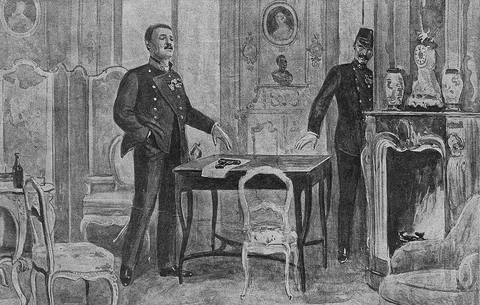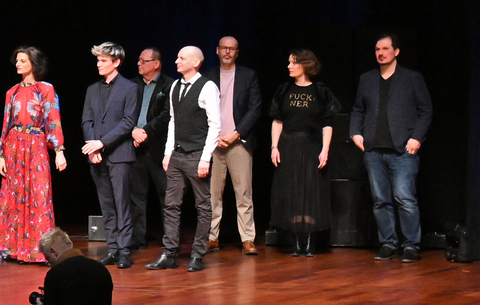Let them sue?
Civil liberties enshrined in the constitution leave the government little room for manoeuvre when it comes to taking legal steps against extremist groups.
Socialist politicians have been getting excited since Ferenc Gyurcsany promised more effective action against far-right groups and websites that he labelled fascist. The prime minister promised to amend legislation on free assembly and free speech to place extremist activities under closer surveillance.
But Ferenc Kondorosi, a state secretary, told HVG that a Justice Ministry proposal relating to the far-right website kuruc.info could not go very far. "I see very few possibilities for change within the existing criminal law framework." According to the ministry, slander, libel and incitement are already punishable offences. An individual can obtain compensation for libel. But freedom of expression is interpreted much more broadly in the case of incitement. According to Kondorosi, "you have to start with the constitutional right to freedom of opinion." The Constitutional Court (AB) has several times declared freedom of opinion to be a fundamental right that takes precedence over almost all others. Freedom of opinion, the Court has argued, can only be infringed if not doing so would affect individuals' fundamental rights.
The Justice Ministry is staying within the AB's parameters. They presumably remember that the AB has already nullified laws on incitement passed by the Horn and Medgyessy governments. Parliament is currently debating a proposal by the Socialist MP Gergely Barandy, which seeks to make expressions of extremist opinion subject to criminal prosecution. Dezso Avarkeszi, the Socialist president of the parliamentary constitutional affairs committee, has also signed this motion, which is supported by all the committee's socialist members. But the Justice Ministry and the government as a whole agree with the Free Democrats, who voted to stop the proposal from going onto the parliamentary agenda.
But the ministry does think it possible to make life difficult for websites which are the subject of criminal prosecutions. Their proposals would give prosecutors or judges the ability to force data carriers - not the websites themselves, but the internet service providers - to bar access to criminal content. Kuruc.info, a far-right website, would not be affected by this. The site is hosted on an American server and could only be shut down if a crime it committed was also an offence under American law.
The prime minister thinks changes to civil law could be more promising. Current court precedent only allows somebody to sue in defence of their civil rights if he or she is directly affected. Civil law experts are not sure that the law needs to be interpreted so exclusively. But two senior civil law judges recently wrote in an academic journal: "The question of who is allowed to sue in the case of a broad community's rights being infringed is not fully answered. But this question has to be resolved not by a court-set precedent, but by legislation."
The Justice Ministry is taking this approach. The ministry's proposal would allow anybody who identified a case of a group's rights being infringed to seek legal redress, even if he or she was not directly affected. This would open the doors for floods of lawsuits, since anyone could now sue. Given Hungarian customs, courts would have to brace themselves for an avalanche. The same senior judges are also aware of this, and say they would not favour such an unconstrained right. They argue that an organisation "with the right to represent a group whose rights have been infringed" should have the right to sue. This is striking, since it runs against a proposal made by Zoltan Lomnici, president of the Supreme Court. This proposal would also allow anyone to sue. But his proposal differs from the government's in that it would allow the prosecutor's office to involve itself in civil cases relating to hate speech.
This spring, the government moved changes to the law on assembly. This week, two Socialist MPs have tabled changes to the law on association. Zoltan Szabo and Zsolt Torok say things have changed and that extremist groups are appearing on the scene with ever greater frequency. The two politicians believe this could be prevented by incorporating a passage from the 1947 Paris Peace Treaty into the law on association. This paragraph forbids the formation of fascist-inspired military-style or revisionist organisations in Hungary. Of course, the founders of these far-right associations are familiar enough with the law to know that they cannot incorporate openly illegal - fascist - passages into their rulebooks. For this reason, Szabo and Torok would allow the judge to look not just at the group's rules and bylaws but to use his or her intuition as well. This would mean that if a judge felt, on the basis of a group's rules, slogans or symbols, that there was a danger of it breaking the law, he could refuse to register the new association. This is not currently possible. If a group breaks the law, the prosecutor's office can move against it. In some cases, as with happened with the Blood and Honour group, the court can even disband the grouping.
ISTVÁN RIBA
But Ferenc Kondorosi, a state secretary, told HVG that a Justice Ministry proposal relating to the far-right website kuruc.info could not go very far. "I see very few possibilities for change within the existing criminal law framework." According to the ministry, slander, libel and incitement are already punishable offences. An individual can obtain compensation for libel. But freedom of expression is interpreted much more broadly in the case of incitement. According to Kondorosi, "you have to start with the constitutional right to freedom of opinion." The Constitutional Court (AB) has several times declared freedom of opinion to be a fundamental right that takes precedence over almost all others. Freedom of opinion, the Court has argued, can only be infringed if not doing so would affect individuals' fundamental rights.
The Justice Ministry is staying within the AB's parameters. They presumably remember that the AB has already nullified laws on incitement passed by the Horn and Medgyessy governments. Parliament is currently debating a proposal by the Socialist MP Gergely Barandy, which seeks to make expressions of extremist opinion subject to criminal prosecution. Dezso Avarkeszi, the Socialist president of the parliamentary constitutional affairs committee, has also signed this motion, which is supported by all the committee's socialist members. But the Justice Ministry and the government as a whole agree with the Free Democrats, who voted to stop the proposal from going onto the parliamentary agenda.
But the ministry does think it possible to make life difficult for websites which are the subject of criminal prosecutions. Their proposals would give prosecutors or judges the ability to force data carriers - not the websites themselves, but the internet service providers - to bar access to criminal content. Kuruc.info, a far-right website, would not be affected by this. The site is hosted on an American server and could only be shut down if a crime it committed was also an offence under American law.
The prime minister thinks changes to civil law could be more promising. Current court precedent only allows somebody to sue in defence of their civil rights if he or she is directly affected. Civil law experts are not sure that the law needs to be interpreted so exclusively. But two senior civil law judges recently wrote in an academic journal: "The question of who is allowed to sue in the case of a broad community's rights being infringed is not fully answered. But this question has to be resolved not by a court-set precedent, but by legislation."
The Justice Ministry is taking this approach. The ministry's proposal would allow anybody who identified a case of a group's rights being infringed to seek legal redress, even if he or she was not directly affected. This would open the doors for floods of lawsuits, since anyone could now sue. Given Hungarian customs, courts would have to brace themselves for an avalanche. The same senior judges are also aware of this, and say they would not favour such an unconstrained right. They argue that an organisation "with the right to represent a group whose rights have been infringed" should have the right to sue. This is striking, since it runs against a proposal made by Zoltan Lomnici, president of the Supreme Court. This proposal would also allow anyone to sue. But his proposal differs from the government's in that it would allow the prosecutor's office to involve itself in civil cases relating to hate speech.
This spring, the government moved changes to the law on assembly. This week, two Socialist MPs have tabled changes to the law on association. Zoltan Szabo and Zsolt Torok say things have changed and that extremist groups are appearing on the scene with ever greater frequency. The two politicians believe this could be prevented by incorporating a passage from the 1947 Paris Peace Treaty into the law on association. This paragraph forbids the formation of fascist-inspired military-style or revisionist organisations in Hungary. Of course, the founders of these far-right associations are familiar enough with the law to know that they cannot incorporate openly illegal - fascist - passages into their rulebooks. For this reason, Szabo and Torok would allow the judge to look not just at the group's rules and bylaws but to use his or her intuition as well. This would mean that if a judge felt, on the basis of a group's rules, slogans or symbols, that there was a danger of it breaking the law, he could refuse to register the new association. This is not currently possible. If a group breaks the law, the prosecutor's office can move against it. In some cases, as with happened with the Blood and Honour group, the court can even disband the grouping.
ISTVÁN RIBA








